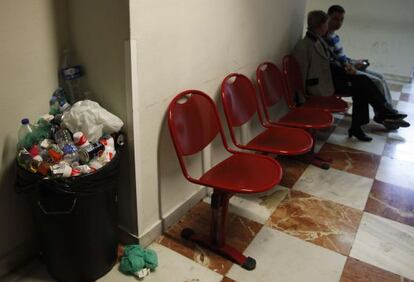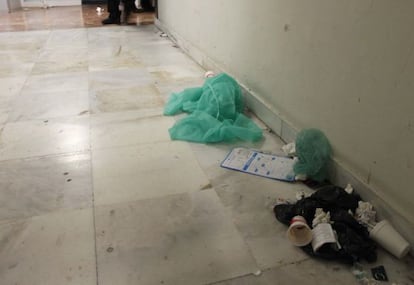"Mom, bring me some bleach!"
A strike by cleaners at the Alicante General Hospital has left the wards filthy Only vital parts of the building, such as the emergency room, are being kept clean

Alicante's General Hospital does not smell like a hospital. It smells like a cesspool, thanks to all the waste that is piling up. The stains on the floors are shocking. Some are recent, but others have formed into thick crusts. The hallways ring out with the same comments, repeated over and over: "This is a disgrace;" "This is disgusting;" "What's going on here?"
What's going on at this major provincial hospital, which serves nearly two million people, is a strike by cleaners, who have grown tired of working since November without being paid by the regional government. When EL PAÍS visited the health center, it had gone 13 days without its usual cleaning services.
"My mother brought me a bottle of bleach for the toilet," says Merche Alonso, who was admitted six days ago and is waiting for a scan. "Minimum services on my floor means changing the garbage bag inside the bathroom. There are seven centimeters of fluff and dust under my bed. There are people with asthma here, it's shameful that we should be in these conditions. I want to be discharged right now because anyone could catch a disease in here."
Regional governments have been unable to meet payment deadlines for basic services in the health system
The inability of regional governments to meet payment deadlines for basic services in the health system - cleaning in this case - is creating a new source of conflict in a sector that is already up in arms over personnel cuts and other spending restrictions, or because of privatization plans, as is the case in Madrid.
In November, a group of 30 businesses who supply the Valencia public health system filed a complaint, alleging they were owed between 28 and 30 million euros. In Spain as a whole, the public health system owed suppliers an estimated seven billion euros at the end of 2012.

In Alicante, hygiene has become the first victim of the delayed payments. Milagros Martínez, a nurse, talks about "the shame" of having the General Hospital in this state ever since the cleaners went on strike on December 26. "They have to be paid right now - this can't carry on."
As the elevator doors open, a woman takes a look inside. "Good lord, look at the state this is in!" she says, before opting for the stairs instead. And it's no wonder: the pile of trash inside the elevator is about 40 centimeters high.
The hospital looks like a breeding ground for germs. There are bits of plastic strewn across the hallways, all kinds of stains on the floors, and bottles, cans and pieces of paper lying around everywhere. That typical hospital smell of disinfectant is conspicuous by its absence. The only completely aseptic parts of the hospital are the emergency room, the intensive care unit, the maternity ward, the delivery room, the surgery rooms and a couple of other crucial areas.
The striking spreads
"Nobody is taking responsibility, so who can we complain to?" asks Clara Isabel Parejo, crying on a bench across from the hospital. This woman, a cleaner at Alicante General Hospital for the last 22 years, explains how the 240 striking workers have been helping each other out financially. Some have seen their electricity and water services cut off at home, while others spent Christmas Eve by candlelight.
Francisco García, a member of the worker's union, explains the situation. "We spent four days calling [the company] and got no answer. They showed up here on the ninth day of the strike, saying that they had the money but would not pay until the regional department did so first."
The German company Klüh Linaer said in a press release that the amount it owes workers is "not even 10 percent" of what the union claims (300,000 euros) and considers the strike a "drastic" measure. It also stated that it began providing its services one month before other contract winners in the Valencian public health sector, "with the goal of freeing up hospital staff from the payment default problem they had been putting up with from the previous company." ESABE Limpiezas Integrales S.L. walked out a year ago and failed to pay its workers, who have sued.
The 55 workers from 13 other health centers served by Klüh Lanier joined the strike this week. Francisco Utillas, who has been at Alicante General Hospital for 22 years, says that the employer/employee relationship is limited to the delivery of material. "They buy it and another private company delivers it to us. Each time they buy a different brand; perhaps they aren't paying their suppliers," he notes sarcastically. "This is what Spain can expect. We have fixed jobs at the hospital, they don't pay us, and management looks the other way."
Luis Iborra, just back from Mexico to visit his sister, who gave birth here, put it succinctly: "I felt very weird in there. It was a bit like The Walking Dead [the horror genre TV show]. It was as if a zombie was going to pop out at any moment."
Paco José Sala, a patient in the pulmonology ward, walks down a hallway in disbelief. "This is a pigsty. It's a dump. I'm still breathing okay, but there are people who are breathing in dust. [...] And nurses are giving grief to people who bring their own bleach and mops from home."
When the strike began, the German firm Klüh Linaer owed its workers pay for November and December, plus their Christmas bonus. After several days of striking, however, the employees managed to get one month's pay and the bonus in a hurry. Meanwhile, the Valencian health department says that they are in talks with the company to ensure that workers "receive their December pay packet as soon as possible."
"This is the kind of health system we've got coming," warns Lourdes Pérez, an assistant nurse at the Infectious Diseases unit. "This is the second Christmas that they have done something like this [to the cleaners]; last time it was a different company." Lourdes and her colleague María Teresa Requena took advantage of the fact that the Christmas decorations were being taken down to clean "a bit." Otherwise, says Requena, "it instills despair when you see all the dirty hallways and rooms. It smells awful. And when the light shines in you can see the dust all the way to the end of the hall."
Tu suscripción se está usando en otro dispositivo
¿Quieres añadir otro usuario a tu suscripción?
Si continúas leyendo en este dispositivo, no se podrá leer en el otro.
FlechaTu suscripción se está usando en otro dispositivo y solo puedes acceder a EL PAÍS desde un dispositivo a la vez.
Si quieres compartir tu cuenta, cambia tu suscripción a la modalidad Premium, así podrás añadir otro usuario. Cada uno accederá con su propia cuenta de email, lo que os permitirá personalizar vuestra experiencia en EL PAÍS.
¿Tienes una suscripción de empresa? Accede aquí para contratar más cuentas.
En el caso de no saber quién está usando tu cuenta, te recomendamos cambiar tu contraseña aquí.
Si decides continuar compartiendo tu cuenta, este mensaje se mostrará en tu dispositivo y en el de la otra persona que está usando tu cuenta de forma indefinida, afectando a tu experiencia de lectura. Puedes consultar aquí los términos y condiciones de la suscripción digital.








































